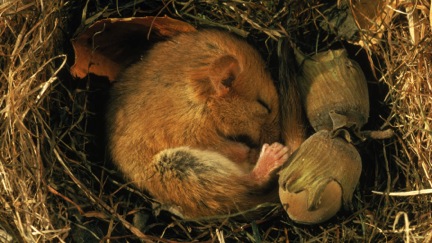Winter "sleepyheads"
Wouldn’t it be nice to be able to stay in bed on the really cold days of winter? Some animals do!
Hibernation is when animals become inactive during colder times of the year in order to conserve energy. They will reduce their body temperature, breathing rate, and heart rate. They do this because in winter it can be difficult to find food, and they may spend more energy looking for food than they would get from actually eating the food!
Have you heard of bears “sleeping through the winter?” Hibernation isn’t exactly the same as sleeping. When an animal sleeps, its metabolism (the process the animal uses to produce energy) slows down only a little bit, and the animal will wake up quickly if needed. A hibernating animal usually slows down its metabolism a lot because it doesn’t need the energy, and will wake up very slowly when it is ready.
How an animal prepares for hibernation will depend on the species. Some species, like chipmunks, will collect food and fill up their burrows to last them through the winter. They will wake up to eat every now and then, and then will go back into hibernation. Other animals store energy as fat in their bodies. These animals have two different kinds of fat – white fat, and brown fat. The brown fat is special as it collects around important organs like the brain and heart to keep those organs warm.
Did you know – there is also a summer version of hibernation called estivation! Animals that live in the desert will sometimes estivate if it is hard to find food and water in the very hot summer months!
Content by Chloe Mitchell, 2/19/16
Photo: http://www-tc.pbs.org/wgbh/nova/assets/img/full-size/human-hibernation-hypothermia-merl.jpg



